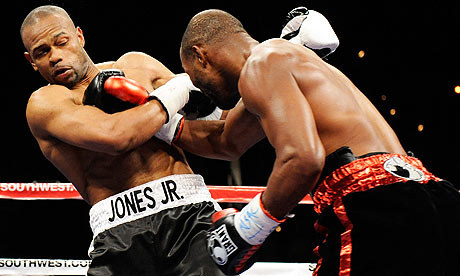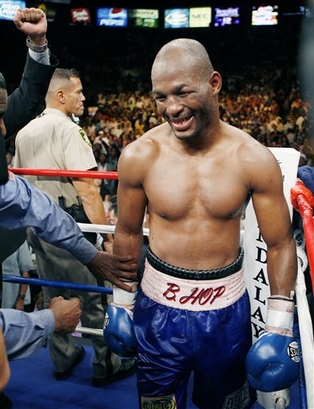That said, I'm pretty sure that it did.
The footnote of the day comes in a historic performance from Bernard Hopkins who, in soundly outclassing Jean Pascal in a rematch of a draw he clearly won, became the oldest "legitimate" boxing champion.
The history, despite its rarity, is less interesting than the fight itself. A fight without a significant knockdown which went the distance. Without great injuries or heroic comebacks. A bout which became an instant classic.
This was not a portly, sluggish George Foreman showing old man strength in pawing his way though the odds against Moorer with a doubled two-piece (no biscuit) in the late rounds. This was not an intended sideshow with a Hollywood ending. This was championship boxing.
For twelve rounds, B-Hop embodied his craft. Bernard Hopkins was not merely an aging boxer illustrating the difference in skill and seasoning between he and an athletically superior champion eighteen years his junior; he was boxing. In the feet, head and hands of the last of his kind, Bernard represented the sport, sticking up for itself. Making a case for its artistry and the nuance which differentiates true boxers from simple fighters. The Samuel Peter's of the world, banking on one-shot power or the lightweight volume punchers mashing each other into paste.
The paper champions. The slam dunk weekend warriors with no mid-range game. A new sneaker to sell.
On 5/21/2011, the executioner was not himself, rather, he became Jordan on the Wizards. Every dirty trick, every mental game, every spurt of dominance and adjustment to the opponent made that much more transcendent by the immense vulnerability in his age, his diminished but still formidable skill, and for the fundamental change in his style. This was Bernard, the quintessential defensive counter-puncher going toe to toe. Not flirting with it. Standing, trading, and still managing to show elusiveness, to show the character of his style even in discarding it almost completely past round four.
Try and remember that time. So spoiled with his greatness, that we forgot Michael Jordan for Tracy Mcgrady the year, with one decent knee, he scored his number. 23. The year he scored 22 straight points in a game at 40 years of age. The year he showed that defense was still the benchmark of the truly great basketball player with the most iconic block of his career: http://www.youtube.com/watch?v=vS9PoDuBKjI&feature=related
Also the year he missed a wide open dunk. Lunging for steals and gambling against quicker, stronger and more spry guards half his age. The year he spent communing with the sideline treadmill, trying to keep warm, struggling with the weight of his own legacy. A final comeback most try to forget.
Beyond his mixed recent history against elite competition, Hopkins was hurt twice in the fight against Pascal. Once early, and once in the final round. It was not dominance executed without fear of failure. The tension suffused every jab and feint in Hopkins high-wire act against age and odds. even out-pointing and out-landing the champion for each round following the first, there was never a moment without the feeling that the other shoe might drop. Violently. Yet, it didn't.
Everything considered, this might have been Bernard's 43 points at 40 years of age moment. The last hurrah.
It's easy to dismiss the comparisons between the two men; the glaring differences say one existed in a team sport, another in an individual one, one was blessed with immense physical gifts, the other arguably average: but the essential truths of their makeups make the points moot. These sportsman built themselves. Their legacies and greatness had less to do with the highlights, but rather, the small details.
The pass to Steve Kerr. The shrug of a desperation haymaker and a clinch to follow.
They were never supposed to be the best. Jordan was cut from his high-school team. Hopkins had his amateur career behind bars. Jordan was drafted after Sam Bowie and sent to a miserable Bulls team. Hopkins spent most of his career being ducked or disrespected before his historic defense streak. They both suffered losses against their chief rivals before achieving greatness. Jordan was dismissed as a one-man team, repeatedly embarrassed by Detroit before breaking through in 90-91. Bernard was suffocated and dominated in 93 by Roy Jones Jr.
In the end, we know how those stories played out.


Admittedly, there was probably a point where Jordan was more Roy Jones than Hopkins, and there are perhaps more apt comparisons with Muhammad Ali, but they clearly share the same heart. Charles Barkley or Dennis Rodman comparisons might spring to mind based on dominance defying expectation and the public persona of each, but they don't hold up. Neither was the same kind of force. Neither dominated, sometimes, without seeming like they were. And being fair, Jordan was Hopkins much longer than he was Roy Jones in his career; i.e. the freakish athletic talent, which quickly gave way to the winning Jordan. The one who played shutdown defense. Who was more of a jump-shooter than a slasher. A tactician. A student and a teacher. Behind closed doors, as the Jordan mythos finds itself deconstructed through time, He and Hopkins resemble one another more and more in their defining traits.
Steadfast refusal to give in. Singularity of focus. The dirtiness and anger of their competitiveness. Their comprehensive understanding of the game each played.
The bittersweetness lies in the reality, that despite greatness, Bernard wont be around much longer. That we wont see a boxer like this again, and perhaps, that we may never see boxing like this again.
It's a thought that hopes itself to be alarmist. That prays for a Kobe Bryant or a Lebron James in the years to come for the middleweight and light-heavyweight divisions. That knows that there will be others. Other great athletes/players to come and attempt to fill the role, but perhaps none we will ever accept. None we can see with the same eyes. Believe in the same way.
Truthfully, as defining a performance as Bernard Hopkins gave this month, this will not be what he is remembered for. It will not matter, like Jordan, that he did not end as a wilting flower (like Ewing on the Sonics), but rather, as a force in a sport becoming human. Becoming nothing shameful; but nothing we want to see keep going, whatever their desires might be.
It's awfully easy to miss the details when someone's fading from view.
Still, these moments demand recognition from a public that depreciates its own entertainment. Who often dismiss ugly perfectionism for the ease of flashy mediocrity. Who increasingly run to the stat sheets, the numbers over everything, making fantasy sports of reality and ruining both.
I know what I saw when I watched that fight. It's the first sign of it I've seen in boxing since Castillo-Corrales 1. Not goodness, not entertainment: Greatness.
Here's to the hope that we take the time to remember it.


(*beyond Manny Pacquaio and Floyd Mayweather's protracted filibuster towards the last genuine marquee match-up in boxing)